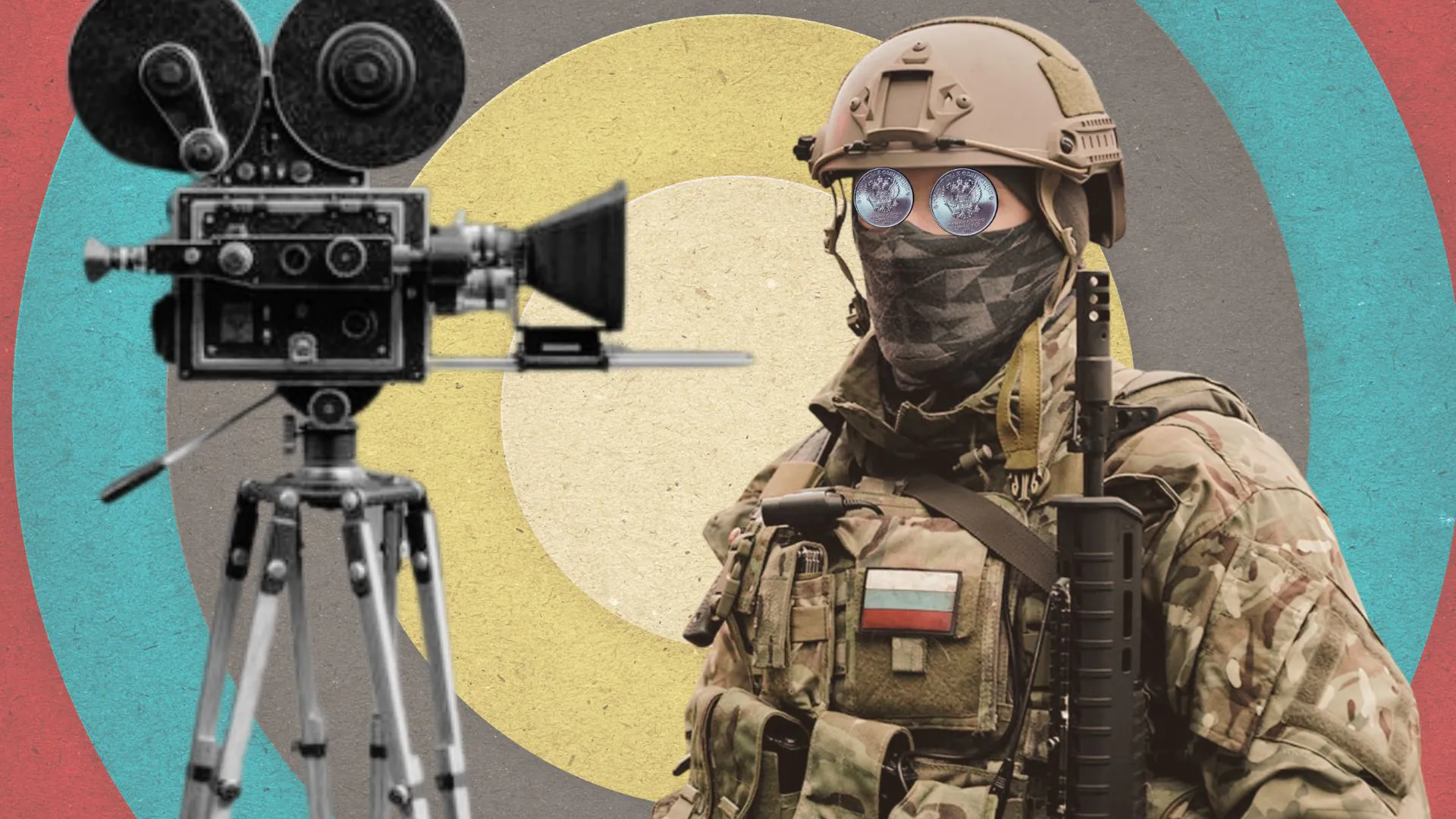

“If you haven’t served, you’re not a man” and big money. How Russians lure Luhansk residents into the army
Bribery, intimidation, toxic masculinity, provocations and manipulations are all used by the Russian occupiers to lure men in the occupied territory to serve under contract in the Russian army, Realna Gazeta reports.
Not all content in the pro-Russian segment of social media, radio or television was created specifically for Luhansk residents. Since August, contract service has been more actively advertised in Russia, and propagandists in the occupied territory have joined the campaign. The main messages included “defence against the Nazis”, “grandfathers fought” and “if you didn’t serve, you’re not a man”.
Calls to take up arms can be seen everywhere in Luhansk: on local television, radio, social media and in advertisements posted on city fences.
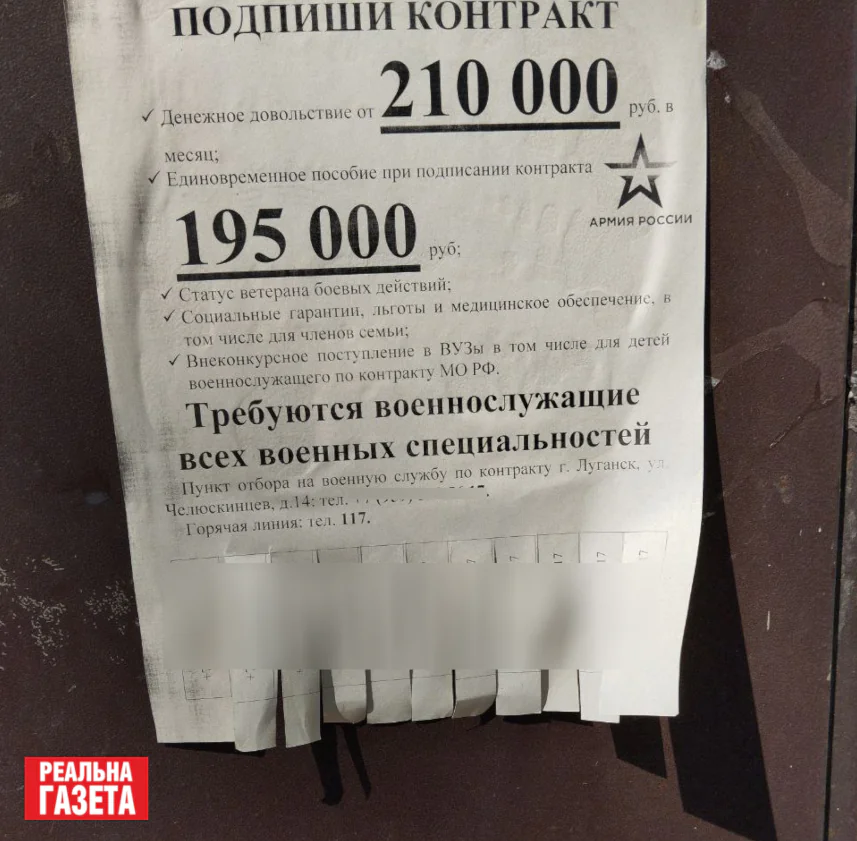
Ads for contract service in Luhansk are posted at entrance halls and on fences
Be a man. How Russians use masculine clichés to promote contract service
All propaganda videos on the topic of contract service convey a message of “masculinity” and “manhood”. The idea that a fighting man retains his special “masculine” dignity is a patriarchal masculine attitude deeply rooted in Russian society.
“Contract service is an opportunity for every man to show courage and bravery in defence of Russia and his family,” says one of the campaign adds.
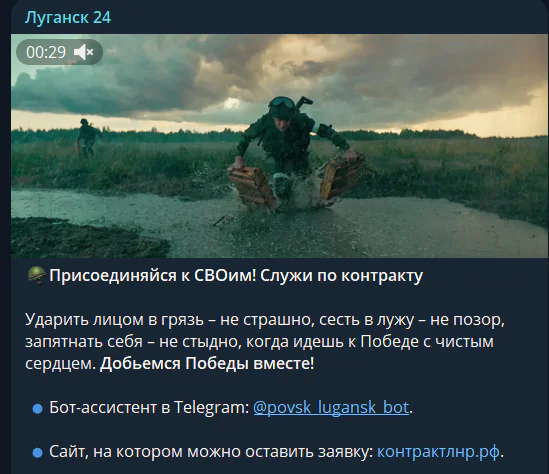
In general, all advertising for contract service is based on the image of masculinity. A “proper” man is expected to be self-confident, avoid anything feminine, cruel, dominant, have a negative attitude towards sexual minorities, and have limited emotionality, where the only “allowed” emotion is aggression. Such “masculinity” means a society where gender qualities are clearly distinguished: men are brave, persistent and tough, while women are more modest and gentle.
But if you are a girl, there is a place for you in the Russian army as well. We found an advert on the Luhansk 24 Telegram channel that offered girls to become drone operators. The first requirement was age – under 35. Previously, the Russians had not tried to recruit women into their ranks.
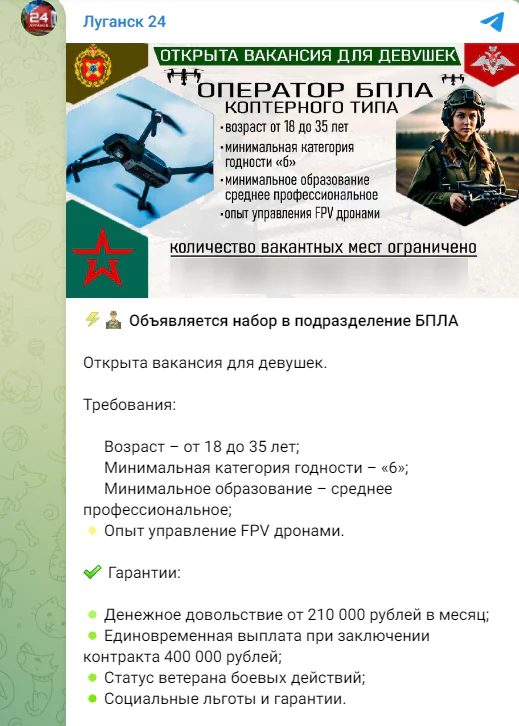
In addition to drone operators, the Russians are also looking for doctors. The requirements include being under 38 and having a medical degree. It is extremely easy to sign up for an interview with recruiters. You can either call the phone number listed on TV ads or in advertisements on hallways. Or you can simply write to a special chatbot. The information asked for is a little – first and last name, date of birth, and a contact phone number, which will be called back. The same Telegram bot also provides a list of documents to bring to recruiters.

The Russian defence ministry is filming its propaganda on a Hollywood scale. Muscular actors put on military uniforms and appear before the viewer like characters in an action film: they walk with machine guns in their hands through the smoke from a smoke machine. The slogan follows: “You are a man. Be one. Serve under a contract”. The appeal to “men” unites most of these videos.
Another “masterpiece” from the Russian defence ministry contrasts “real” military men with the letter “Z” with “fake” ones: bloggers, models, men who drink cocktails and pierce their ears. “What are our men made of?” the poster asks. And in the end, it calls out: “Join those who are made of honour, valour and courage.” This video was also distributed on the Luhansk 24 propaganda resource.
If the “hook” of “double dare” did not work, they tried to scare a Luhansk resident. A video shows a family: a father, mother and a little boy watching Luhansk television. The news anchor is describing horrors by “Ukrainian militants”. Suddenly, the man imagines that instead of his wife and son, black bags with corpses are lying next to him, and the apartment has been shelled at the very least. Five times (we counted), the hero of the video looks from his family to holes in the wall and decides to sign up for a contract with the occupying army. Suddenly, the news presenter starts talking about “liberation” of another settlement, and the son proudly watches his father on TV.
Luhansk residents who went to “defend their family” also appear on Luhansk television in propaganda videos. “The duty of a man is to defend his homeland, children and women,” says the hero of the news story, who goes by the call sign “Hamster”. The story also explains in detail what payments a contract soldier can receive. This is a typical feature of local propaganda news: A “success story” of a contractor combined with an explanation of what monetary or social benefits he might receive.
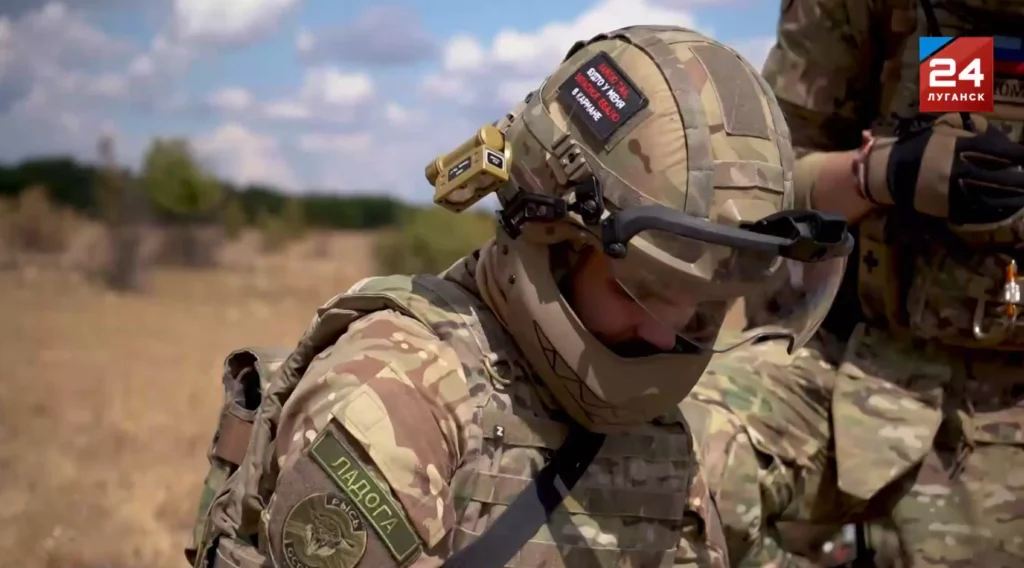
Grandpa made it to Berlin: how propaganda in Russia and under occupation creates the hero image
There are a number of Telegram channels, united by the common name “Heroes of Special Operation Z”, which publish videos with “success stories” of the occupiers. In these videos, men (some without masks and some hiding their faces) tell how they left civilian life and went to war. Most often, these are Russians who “came to defend the people of Donbas” in memory of their great-grandfather, who “reached Berlin”. This is followed by an “inspirational” story about the hero’s combat service in a tank/artillery/motorised infantry regiment. All the heroes are deliberately masculine, radiate confidence and health, look neat and speak competently. There is no mention of mutilations, serious injuries or the loss of comrades. There is also no mention of commanders’ bullying, pits for those who refuse to fight or wounded soldiers being sent into battle. The purpose of such videos is to promote the image of a “hero of a special military operation” in the most attractive way possible.
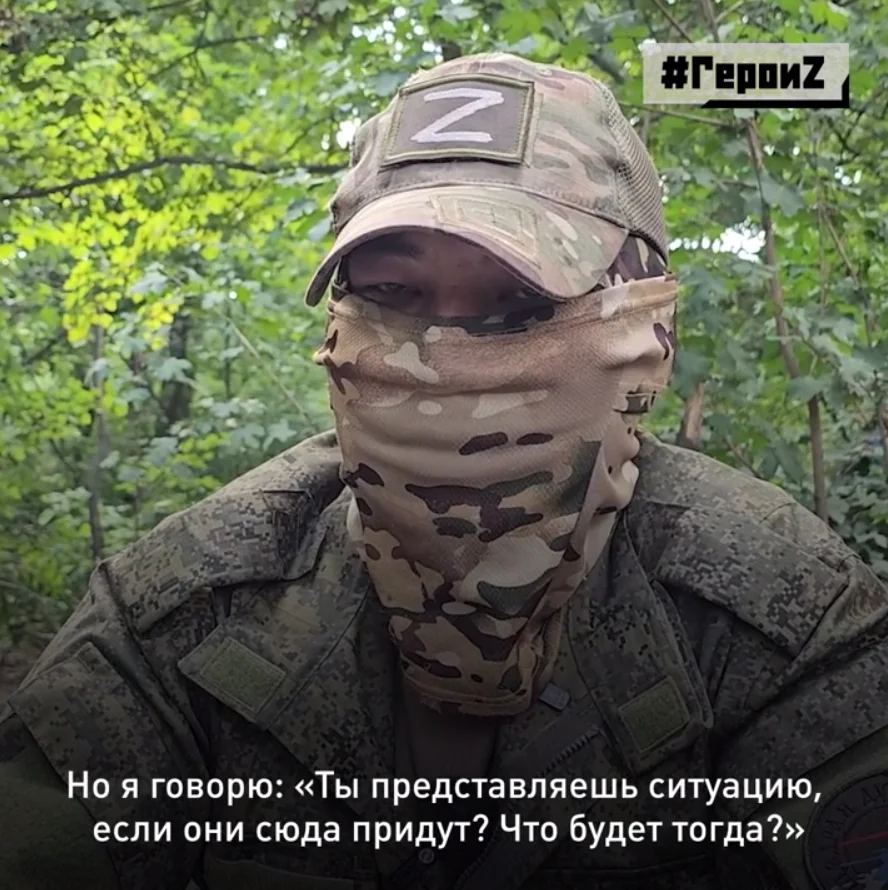
Propaganda Telegram channels such as Luhansk 24, LuhanskInformCentre, and LuhanMedia are eager to distribute videos of the “Heroes of Special Operation Z”, and with them the image of a heroic-looking “defender” who is fighting not for money but for an idea. However, we will come back to money later.
Recently, the narrative of the Battle of Kursk has been added to the “heroic” stories. Kremlin propaganda has sent out ‘temniks’ to the media and bloggers, instructing them to compare the Ukrainian offensive in the Kursk region with the Battle of Kursk. The story of another “decisive battle with the Nazis near Kursk” is combined with a call to “become a hero of the special military operation”.
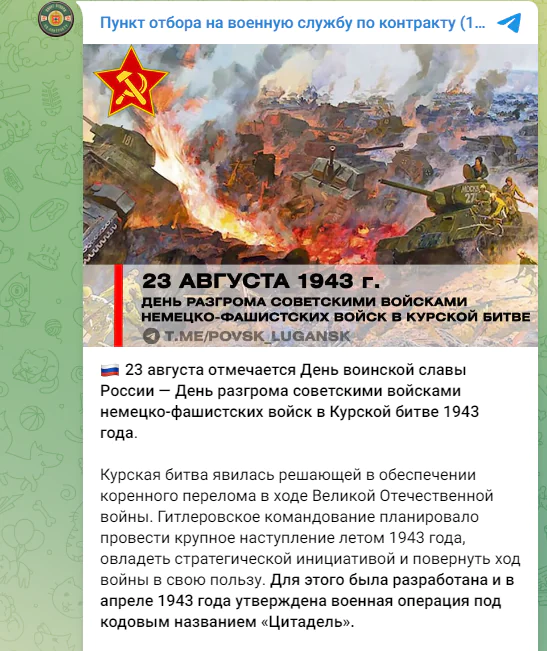
“The Ukrainian Nazis made a big mistake when they entered the Kursk land… The Black Sea Fleet marines are now taking part in an operation to expel the enemy from the land that their grandfathers once liberated from the Germans,” the invader in balaclava declares.
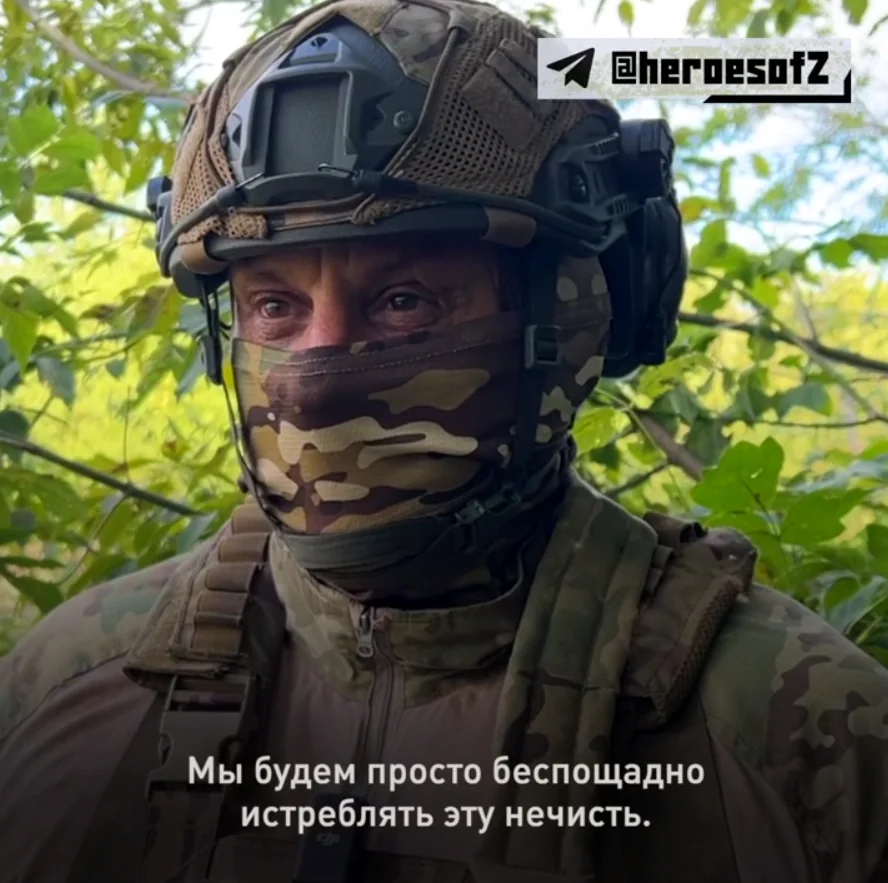
Local “official” accounts promote a recruiting Telegram channel where the Battle of Kursk is just a pretext to invite people to join the Russian army. The channel is targeted at men from Luhansk: the address and phone number of the recruitment centre in the city are given. There are photos of the Gostra Mohyla (Sharp Barrow) WWII memorial, which has recently been used to impose an idea of a common history and military victories with Russia.
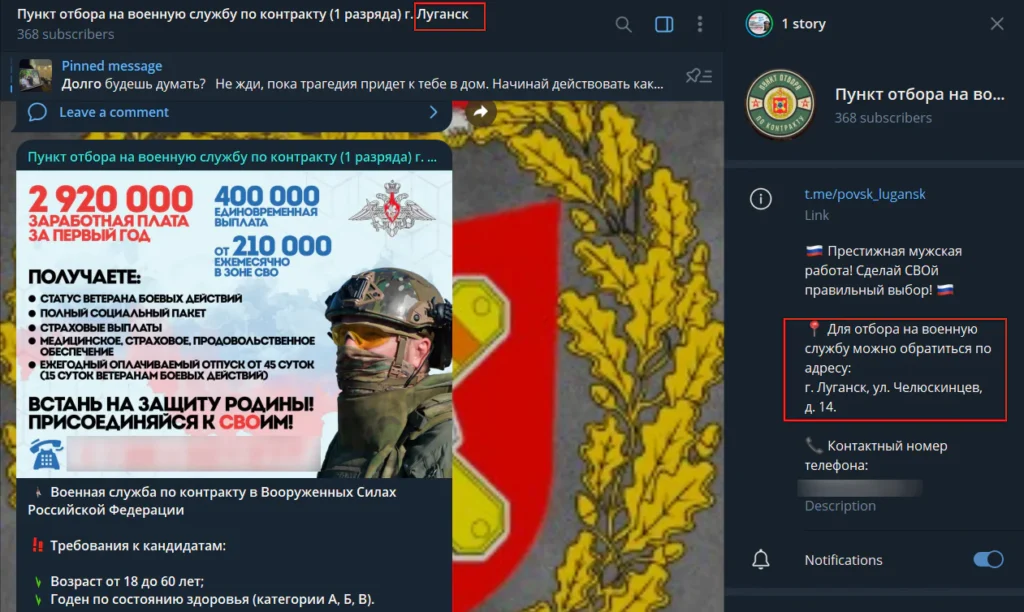

Some of the videos from the Russian defence ministry distributed by Luhansk propagandists are more concise. For example, one is shot in the first person in the style of a computer shooter game, with soldiers running in a trench, storming a fake stronghold. It is alleged that this is how Russian assault troops train.
In another story on Luhansk 24, a Russian man talks about the benefits of contract service, claims that “the local population treats him well” and states pathetically: “Where we stand, Russia is there”.
The price of the issue. How much can a Luhansk man be bought for?
However, the main incentive for signing a contract is a monetary reward. A recruit is promised 400,000 rubles as a one-time payment (the so-called “lifting fee”) and 210,000 rubles per month. The advert promises that a contract soldier will earn 2 million 290 thousand rubles in a year. For Luhansk, this is a lot of money, but it can only be obtained by risking your life.
The number of commercials about contract service in Luhansk public spaces has increased after Russia increased the payment to “volunteers”. Now, those who sign a contract from August 1 until the end of the year will receive 400,000 rubles (approximately 180,771 hryvnias). “Join the service under a contract and be with your own people!” the advert calls. In addition, potential contract soldiers are offered “bonuses” for assaults, offensives and destroyed equipment of the Ukrainian Armed Forces.
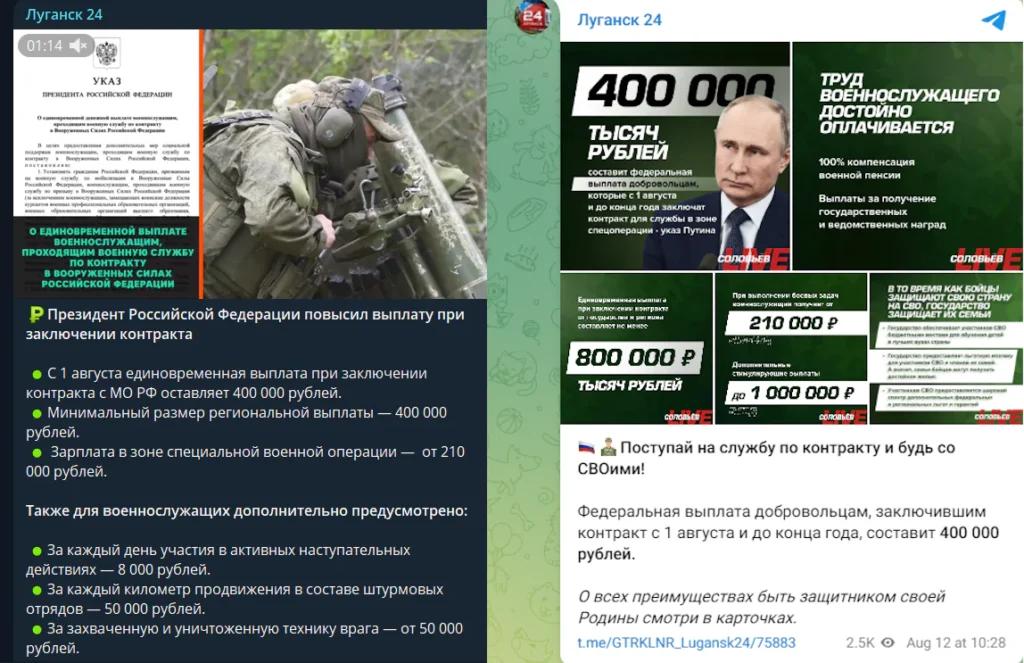
Recruiters offer a standard set of “bonuses” for those wishing to sign a contract: combat veteran status, a full social package, food, loan write-offs, housing for some military personnel, preferential mortgages, state-funded places in educational institutions for children, and exemption from criminal liability. Although some of these benefits exist in Russia only as draft laws or proposals, potential contractors are being promised them now.
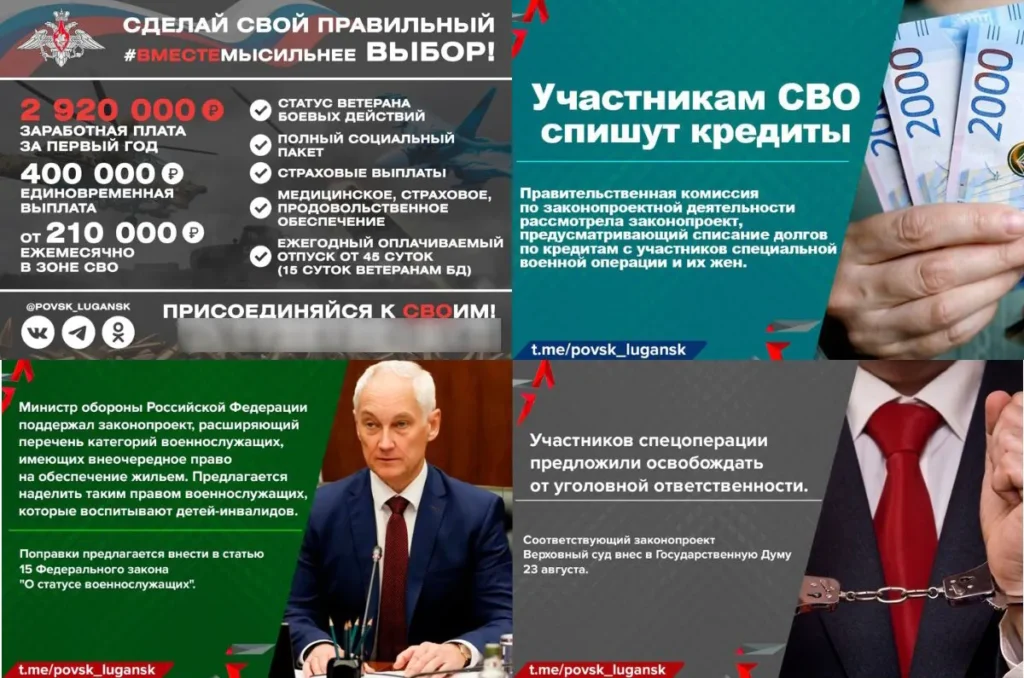
A propagandist from Luhansk 24 tells of a smiling deputy policeman, “Demon”, who served in Syria and went to Ukraine in 2022. For this, he received the right to a military mortgage, and the “defender” is already preparing to take the keys. “While our heroes are fighting on the frontline, the state is taking care of their families,” the propagandist assures and lists the payments and benefits that a contract soldier can expect if he survives.
At the same time, the deputy commander broadcasts standard Kremlin clichés about “bringing victory closer as soon as possible” and “pushing back the enemy so that it does not go deeper into the country”. “They just want to oppress our country, everyone understands that we have the richest resources in the world. Imagine someone coming home to me in the Vladimir region!” “Demon” says.
Athletic soldiers, “real” men, grandchildren succseeding their grandfathers, and lieutenant colonel “Demon” – all these images are used to convince men that they join the Russian army to fight for an idea. However, the main tool for attracting new contract soldiers is payments. Russian regions continue to increase their payments, competing for those willing to sign a contract. Moscow is in the lead in this race. There, contract workers are promised 1.9 million rubles. Local television reports on crowds of people willing to serve. However, the increase in contract payments shows the opposite: there are not enough people at the front. Even those who have been wounded are being sent into battle.
The lives of contract soldiers recruited in the occupied part of the Luhansk region are valued much lower than in Russia. For example, a contract soldier will receive the 400,000 rubles of federal pay promised by Vladimir Putin and a regional payment with a minimum amount of 400,000 rubles. However, in the occupied territory, it may be even less – the Luhansk “republic” has never announced the amount and has not tried to “compete” with Russian regions for mercenaries.
It is impossible to estimate from open sources how successful the Russian recruitment campaign in the occupied Luhansk region has been. The Russian authorities overstate the number of contractors from the Russian territory and do not disclose it for the occupied territories. However, large payments may tempt residents of the war-torn, broken by unemployment and uncertainty region.